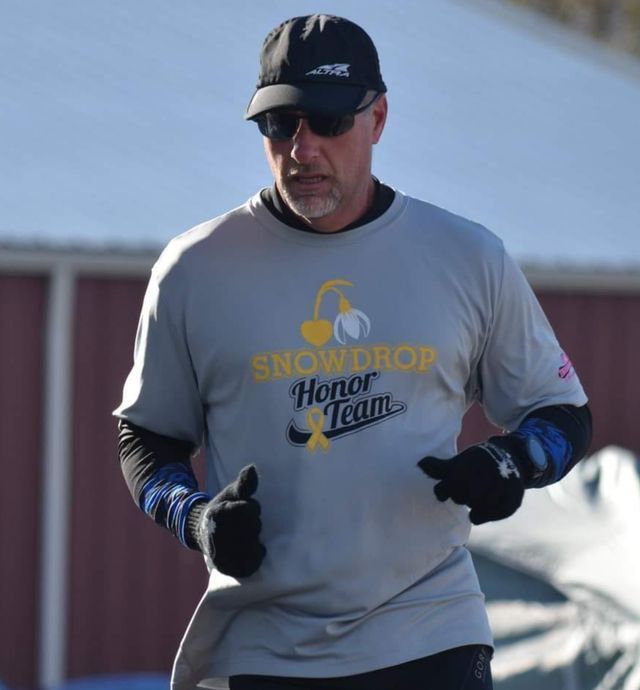When Kevin Kline is running, he doesn’t think about the number of miles ahead of him. Instead, his thoughts turn to Dylan, who had her leg amputated, Damian, who was diagnosed with a brain tumor, and Macy, who lost one of her eyes.
All three of these children—along with countless others—are fighting serious battles with cancer. Their strength in the face of a devastating disease inspires Kline to endure when he completes his ultrarunning challenges to raise funds and awareness for pediatric cancer.
It’s why he’ll be carrying their names in a backpack when he takes on his greatest challenge yet: a 300-mile run on the Dalton Highway in Alaska. Made famous by the History Channel show “Ice Road Truckers,” the Dalton Highway is the longest stretch of unserviced road on the North American continent. The gravel and dirt path that stretches across the desolate Alaska wilderness also boasts the coldest temperature ever measured in the United States–minus 82 degrees.
“I think about all these kids who have gone through hardships, something that I will hopefully, never experience, and they’re still going. They are the ones that keep me going,” Kline told Runner’s World.
On November 16, 2019, just a few days before his 50th birthday, Kline will attempt to become the first person in history to run the northernmost 300 miles of the highway on a run called Delivering Hope, with the ultimate goal of raising $200,000 for children’s cancer research. He’ll battle frigid temperatures, wind chills, oncoming traffic, and unpredictable wildlife while running one of the most dangerous highways in the world.
So why would he risk his life to run this road?
“When a kid beats their cancer, they ring their bell, end their treatment, and they feel like they’re on top of the world,” Kline said. “This run is going to take place above the Arctic Circle, which is the top of the world, and that’s where I’m going to take all these kids with their names in a backpack on my back.”
It all started back in 2005. A Houston, Texas, radio host, Kline was broadcasting at the Texas Children’s Cancer Center when he met Chelsey Campbell. At just 15, she was diagnosed with a rare form of cancer, and was given just a 10 percent chance to live for another six months. In February of 2006, she had a 27-hour surgery to remove tumors inside of her body, a procedure that the doctors called a “marathon surgery.” After she left the ICU, Kline felt inspired to run a marathon in her honor.
While Campbell lost her battle to the disease in December 2006, Kline didn’t want her memory to be forgotten. One month later, he ran his first marathon while wearing a shirt with the message: “I’m running for Chelsey.”
“Thirty-two strangers said her name that day,” Kline said. “I told my wife at the end of that race, I said, ‘This is how we’re going to keep Chelsey alive.’”
In her honor, Kline and his wife Trish started the Snowdrop Foundation, a nonprofit dedicated to fighting childhood cancer. The foundation provides scholarships for college-bound cancer patients and childhood cancer survivors, while raising awareness and funding for continued cancer research.
Since 2006, the Snowdrop Foundation has donated $726,000 to research at the Texas Children’s Cancer Center. Kline started raising funds through running in 2009, when he ran across the state of Texas. He has since completed 100-mile races through Zion National Park in Utah as well as the challenging Ultramilano Sanremo, which consists of 175 miles from Milan to Sanremo in Italy.
The nine-day Delivering Hope run will take the ultras to the next level—and he needs to train for it accordingly. John Olsen, the 100-mile American record-holder, is coaching him through the challenge.
[Smash your goals with a Runner’s World Training Plan, designed for any speed and any distance.]
To prepare for the freezing temperatures on the Dalton, Kline has been training on a treadmill inside a walk-in freezer in his garage. For two or three days a week, he completes runs as long as two and a half hours. The freezer not only helps Kline acclimate to freezing temperatures, but also allows him to test equipment he will need on the highway. He is planning a trip with his support crew to visit the highway this month.
The goal is to average 37 miles per day through the desolate wilderness.
“I’m the sole runner, but this is a team effort,” he said of the medics and drivers that will accompany him along the way.
While the Dalton Highway will be the most taxing and dangerous run that Kline has ever completed, the mission symbolizes an even greater challenge.
“If we don’t do something that has symbolic or real meaning to pediatric cancer, then it’s just a run with no story and no greater purpose, and why are we doing it?” Kline said. “If we have the ability to do something, we should use that to promote a greater purpose. I have a unique ability, and I’m very grateful for it. I can suffer. I can endure. If I have that ability, then I need to use it to promote and tell stories of children who are forced to suffer when they shouldn’t have to.”
Taylor Dutch is a writer and editor living in Austin, Texas, and a former NCAA track athlete who specializes in fitness, wellness, and endurance sports coverage. Her work has appeared in Runner’s World, SELF, Bicycling, Outside, and Podium Runner.













